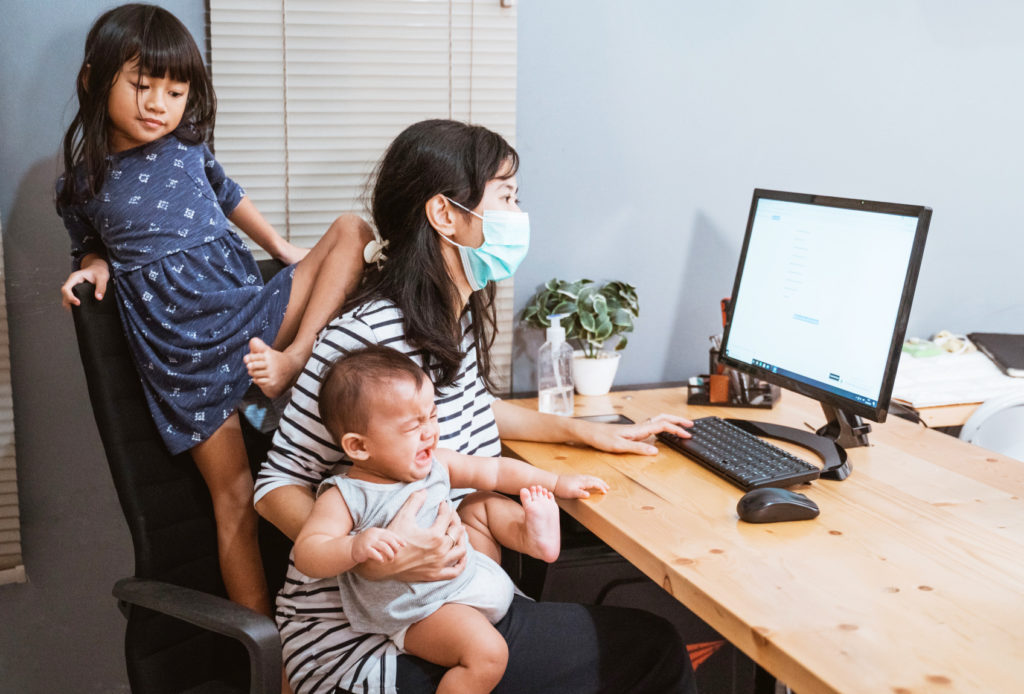Motherhood in the Pandemic
How are families coping with the challenges?
By: María Alejandra Pulgar
Mother’s Day last year came and went without much fuss, as the world was plagued with uncertainty and fear upon the pandemic. After fourteen months living masked and distanced, those fortunate enough to have their mothers around should somehow take the time to honor them. Not all of us have that blessing anymore. This is a tribute to all mothers who still endure these trying times, and keep their families united and afloat.
The pandemic has taken a toll on the finances of families worldwide. A Pew Research study from the fall of 2020 showed that for working mothers in America, especially those Black and Hispanic and the groups with less education, the recession has hit them particularly hard, and they cite as the main reason the complications to find reliable childcare or the lack of a support system; 67.4% of mothers without partners, “with children younger than 18 at home were working compared with 76.1% in September 2019, a decline of 9 %”.
A study from the Wharton Business School at the University of Pennsylvania found that “Since the pandemic began in February, women have been leaving the labor force in significantly greater numbers than men, according to several recent studies based on U.S. Census data. Working mothers are especially vulnerable; they’re nearly three times more likely than men not to be working because of child care demands.”
Even though men are more involved in childcare nowadays than in previous generations, mothers culturally have had the lead role on the raising of children in a family; and when a mother does not have a partner, sharing those responsibilities depends highly on her closeness to family and friends and the availability of affordable childcare.
 The mothers who have made the decision of sending their children back to in-person school and child care centers so they can go to work and provide for their families, are to be commended for their braveness. Doctors, nurses, and other healthcare employees have exposed themselves to COVID at work, so the rest of us can be certain that if we need attention we will receive it.
The mothers who have made the decision of sending their children back to in-person school and child care centers so they can go to work and provide for their families, are to be commended for their braveness. Doctors, nurses, and other healthcare employees have exposed themselves to COVID at work, so the rest of us can be certain that if we need attention we will receive it.
Families’ wellbeing worldwide was hit hard by the pandemic. Many lost their jobs, their homes and loved ones over the course of last year and the potential exposure to the virus is still a dangling sword over the heads of everyone. Honoring mothers on this Mother’s Day 2021 for all their endurance last year is more than deserved.
The best gift they can receive is the love, respect, and consideration of their children and their families, and the attention and assistance to their needs from society.
Mothers were breaking and nobody was listening
The New York Times published in February 2021 a series of articles called “The Primal Scream”, where they covered the ways the COVID-19 pandemic impacted working mothers in America. They created a hotline where parents (not only mothers) could call and scream their hearts out with the frustrations caused by all the issues that aroused over the past year.
Mental health assistance for working mothers is a substantial issue that needs to be addressed. At least with that hotline, many parents had an outlet to express their bottled-up frustrations and worries. But that is not enough assistance. Local organizations have procedures in place to assist families on their mental health. In Florida, the Suicide Prevention Hotline provides Crisis Centers in every county. Help is a phone call away. Do not hesitate to ask for help if you feel you need it: 1-800-273-8255.
The reduction of working hours and food insecurity were the main issues people confronted last year and still do. Feeding America estimates that 45 million people, among them 15 million children, experienced food insecurity last year, and those numbers are not likely to reduce more than 7% in 2021.
Experts on mental health say that the strain that coping with all the stress of the pandemic has caused in mothers is likely to linger and impact their families in the future. Although the end of the pandemic is neither under the control of employers nor the government, there are actions they can take to assist working mothers in coping with its impact.
 How to honor and support mothers this Mother’s Day
How to honor and support mothers this Mother’s Day
The flexible hours and the opportunity of working from home that many employers gave mothers during the pandemic was a dream come true at the beginning but later became a nightmare when the weeks turned into months and the management of childcare at home plus working hours were more complicated than pleasant.
Furloughs or loss of employment impacted severely the stability of households across America, with mothers suffering the greatest impact. On a report for the Opportunity and Inclusive Growth Institute, the economist Misty L. Heggeness made an analysis of the impact the pandemic has had on working mothers. She says “Parents— especially mothers—remain ever vulnerable to the availability of affordable childcare while they work. Without more formal and intentional systems of care, mothers will forever be vulnerable to career scarring during any major crisis like this pandemic or any other event that triggers an increase in domestic tasks within her household”.
The creation of mechanisms for protection of working mothers should be of utmost importance for government and institutions. Mothers, as first caregivers are the main people responsible for giving their children the security and education they need to thrive and become productive members of society. Not only on Mother’s Day but every day the best gift they can receive is the appreciation and support from their families and communities.

